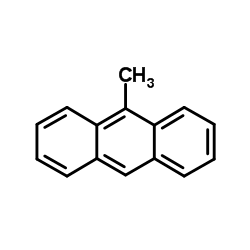9-甲基蒽

9-甲基蒽结构式

|
常用名 | 9-甲基蒽 | 英文名 | 9-Methylanthracene |
|---|---|---|---|---|
| CAS号 | 779-02-2 | 分子量 | 192.256 | |
| 密度 | 1.1±0.1 g/cm3 | 沸点 | 347.2±0.0 °C at 760 mmHg | |
| 分子式 | C15H12 | 熔点 | 77-79 °C(lit.) | |
| MSDS | 中文版 美版 | 闪点 | 157.5±12.8 °C | |
| 符号 |



GHS05, GHS07, GHS09 |
信号词 | Danger |
|
QSPR modeling of octanol/water partition coefficient for vitamins by optimal descriptors calculated with SMILES.
Eur. J. Med. Chem. 43 , 714-40, (2008) Simplified molecular input line entry system (SMILES) has been utilized in constructing quantitative structure-property relationships (QSPR) for octanol/water partition coefficient of vitamins and organic compounds of different classes by optimal descriptors.... |
|
|
A new method for resolution of two- and three-component mixtures of fluorophores by phase-sensitive detection of fluorescence.
Anal. Biochem. 148(2) , 349-56, (1985) We describe a new method for the analysis of phase-sensitive fluorescence emission spectra. This method permits the resolution of three-component mixtures using spectra measured at a single modulation frequency. Phase-sensitive spectra are recorded using one ... |
|
|
Solid-state photodimerization of 9-methylanthracene as studied by solid-state 13C NMR.
Solid State Nucl. Magn. Reson. 11(3-4) , 189-96, (1998) The locus of the photodimerization reaction of 9-methylanthracene in the crystal was examined by high-resolution solid-state 13C NMR techniques. Examination of the 13C spectra of the products showed that only the trans dimer is formed by the solid state photo... |
|
|
Capillary gas chromatography/pulsed supersonic jet/fluorescence excitation spectroscopy for the identification of methylanthracenes in a complex environmental sample.
Anal. Chem. 58(13) , 2825-30, (1986)
|
|
|
Infrared spectra of substituted polycylic aromatic hydrocarbons.
J. Phys. Chem. A 102(9) , 1632-46, (1998) Calculations are carried out using density functional theory (DFT) to determine the harmonic frequencies and intensities of 1-methylanthracene, 9-methylanthracene, 9-cyanoanthracene, 2-aminoanthracene, acridine, and their positive ions. The theoretical data a... |
|
|
Stereoselective metabolism of 9-methyl-, 9-hydroxymethyl- and 9,10-dimethylanthracenes: absolute configurations and optical purities of trans-dihydrodiol metabolites.
Carcinogenesis 7(7) , 1135-41, (1986) Stereoselective metabolism of 9-methylanthracene (9-M-A), 9-hydroxymethylanthracene (9-OHM-A) and 9,10-dimethylanthracene (9,10-DM-A) by liver microsomes from untreated rats, and from rats pretreated with either 3-methylcholanthrene or phenobarbital was studi... |
|
|
Stereoselective fungal metabolism of methylated anthracenes.
Appl. Environ. Microbiol. 56(3) , 661-8, (1990) The metabolism of 9-methylanthracene (9-MA), 9-hydroxymethylanthracene (9-OHMA), and 9,10-dimethylanthracene (9,10-DMA) by the fungus Cunninghamella elegans ATCC 36112 is described. The metabolites were isolated by high-performance liquid chromatography and c... |
|
|
Synergy effects of electric and magnetic fields on locally excited-state fluorescence of photoinduced electron transfer systems in a polymer film.
J. Phys. Chem. A 113(40) , 10603-9, (2009) Photoluminescence of electron donor-acceptor pairs that show photoinduced electron transfer (PIET) has been measured in a polymer film under simultaneous application of electric field and magnetic field. Fluorescence emitted from the locally excited state (LE... |
|
|
Quantification of histamine in blood plasma and cell culture supernatants: a validated one-step gas chromatography-mass spectrometry method.
Anal. Biochem. 308(2) , 300-6, (2002) A novel one-step ethylchloroformate (ECF) derivatization of histamine in biological liquid matrices that allows the sensitive quantification by gas chromatography and mass spectroscopic detection (GC-MS) from small volumes of blood plasma or cell culture supe... |
|
|
The metabolism of 9-methylanthracene by rat-liver microsomal preparations.
Xenobiotica 16(4) , 325-33, (1986) The metabolism of 9-methylanthracene by liver microsomal preparations from 3-methylcholanthrene-treated rats was examined. The principal metabolites identified were 9-hydroxymethylanthracene, the 1,2- and 3,4-dihydrodiols of the parent hydrocarbon and the 3,4... |